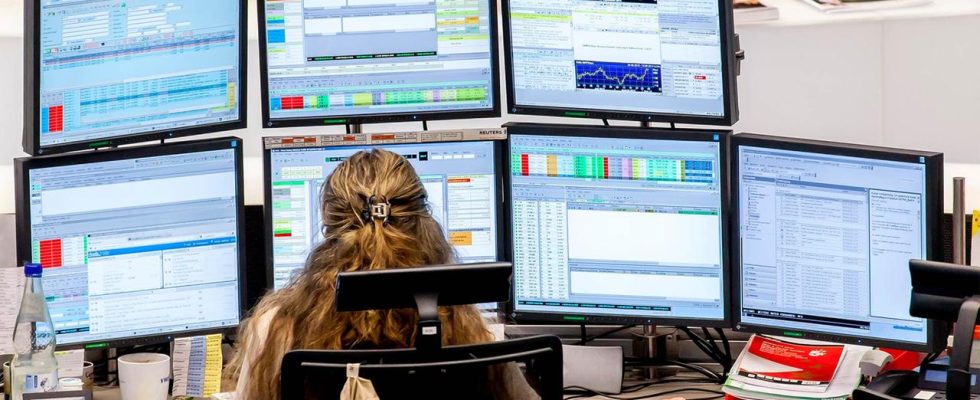background
At the end of the year, the DAX reached new highs. However, small investors are in the minority among buyers on the stock market. Who are the investors primarily?
The insurance company Allianz, software manufacturer SAP, the industrial group Siemens, the car manufacturer Mercedes-Benz – they are all members of the DAX and are therefore among the most valuable listed companies in Germany. But who actually owns the DAX? “The DAX belongs to many,” says the Vice President of the German Association for the Protection of Securities Holdings, Daniela Bergdolt, in an interview tagesschau.de. “It belongs to private investors. It belongs to the funds, it belongs to ETFs, it belongs to institutional investors. Also pension funds and government funds.”
Different Investor groups
So there are different groups of investors. According to a joint study by the German Investor Relations Association and the data specialist S&P Global, almost 13 percent of DAX shares belonged to private investors in 2022. In addition, so-called strategic investors played an important role. They held a 27 percent stake in the DAX. These can be family holding companies or foreign sovereign wealth funds, and in rare cases also the federal government, as is the case with Commerzbank.
The largest part of the DAX cake was the so-called free float, which are shares that can be traded freely on the stock exchange. In 2022, a total of 60 percent was in the hands of so-called institutional investors, i.e. asset managers, banks, insurance companies and pension funds.
According to Kay Bommer from the Investor Relations Association, one group was particularly well represented: US investors. “In terms of institutional free float, they own over 43 percent, which is a very large share.”
“The DAX speaks English”
So is the DAX increasingly in the hands of American investors? Thomas Deser, portfolio manager at Union Investment, summarizes it further: “The DAX speaks English. Around two thirds of the shares are in the hands of Anglo-Saxon, i.e. US and British investors. And yet it is not exclusively US and British money .” Although these institutional investors are based in the USA and Great Britain, German investors also use their products.
According to the study by the Investor Relations Association, large asset managers such as BlackRock, Vanguard and State Street are among the top DAX investors. Your recipe for success: ETFs. These are exchange-traded funds that track an index such as the DAX. You don’t need an active asset manager for this. This also means fewer administration fees.
The Bundesbank has been observing for several years that ETFs are becoming increasingly important for investors and for the financial system. Industry representatives see growing potential, particularly in ETF savings plans, in which you regularly invest a certain amount.
Asset manager works with customer money
The world’s largest asset manager BlackRock has an average stake of five percent in every DAX company. But it’s not BlackRock’s money, emphasizes Germany boss Dirk Schmitz tagesschau.de. It is the assets of the many millions of customers who entrusted their money to the US investment company. “Customers come to us and ask about our products.”
The DAX ETF is predominantly made up of German private investors, says Schmitz, who is responsible for BlackRock’s business in Germany, Austria and Switzerland. Two thirds of BlackRock’s customer assets were used to build wealth for retirement.
“Shareholder is not a gambler”
Anyone who invests in retirement provision on the stock market usually stays with it for the long term. Daniela Bergdolt from the German Association for the Protection of Securities Ownership therefore believes that large asset managers do not have to be bad per se. Especially with a view to retirement provision, Germany needs a different look at stocks, said the shareholder advocate. “We have to get away from the idea that a shareholder is seen as a gambler, that’s not who he is. He invests in our economy. And that’s something completely different.”
The number of shareholders in Germany has recently increased. During the Corona pandemic, more and more young people have focused on their investments. According to the German Stock Institute, there were almost 13 million stock savers in Germany in 2022 – more than ever before.
Nevertheless, the managing director of the German Stock Institute, Christine Bortenlänger, sees numerous hurdles that make buying and holding shares more difficult. “We have the problem in Germany that the state does not encourage the use of stocks in statutory pensions, but also in private pension schemes. Insurance companies are prevented from investing heavily in stocks. There are little or no tax incentives , the share is even disadvantaged.” Bortenlänger sees the federal government’s planned “generational capital” – the start-up funding for which the traffic light canceled due to the budget crisis – as a first step in the right direction.
Increasing interest from foreign sovereign wealth funds
If you look at the ownership structure of the 40 DAX companies, you will notice that foreign sovereign wealth funds have increasingly invested. They are among the so-called anchor investors who hold a significant share in a company. In addition to the Norwegian sovereign wealth fund, they come from countries such as Qatar, the United Arab Emirates and China.
From a certain shareholding size of at least three percent, the shares must be reported to the financial regulator. With the size of his investment, an investor can also expand his influence on a company. Some people view foreign influence on German companies with skepticism and perhaps even worry about a hostile takeover. Shareholder advocate Daniela Bergdolt is different: In her view, sovereign wealth funds are “usually reliable investors with a long-term interest in the company.”
The DAX needs foreign investors, said Bergdolt. “If we didn’t have international investors, we would have to worry because then our companies wouldn’t be attractive.”
Bianca von der Au, HR, tagesschau, December 20, 2023 5:46 p.m

